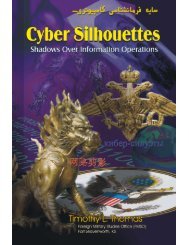China's Rare Earth Elements Industry - Foreign Military Studies Office
China's Rare Earth Elements Industry - Foreign Military Studies Office
China's Rare Earth Elements Industry - Foreign Military Studies Office
You also want an ePaper? Increase the reach of your titles
YUMPU automatically turns print PDFs into web optimized ePapers that Google loves.
year. However, global demand is rising quickly and experts believe there will be a40,000 ton annual shortfall by 2015. 69With so much at stake, it is imperative that the U.S. develop methods toacquire a secure, long-lasting source of rare earth elements. Other countriesrelying heavily on rare earth elements, such as Japan and Korea are scramblingto secure future supplies. Japan, as a huge manufacturing hub of high techequipment, has been carefully monitoring the rare earth industry and trying tocome up with solutions to protect its own needs. One Japanese expert outlinedproposed policies for Japan that would secure rare earth metals. According to theexpert, Japan should strengthen its relationships with current supply countriesand also pursue new frontiers. The report points out that most mines in the worldhave already been “pioneered by the major resource enterprises.” And indeed, inearly 2009, Japan struck a deal to set up a rare earth mine in Vietnam. The minewill solely produce for Japan’s vehicle manufacturers. 70 More recently, inNovember 2009, an article published by The Australian, reported that Japan is“increasingly looking to secure further resources supplies in Australia, with afocus on rare earths, to stem the dominance China has on the market.” TomioHarada, the Australian general manager of the government-backed Japan Oil,Gas & Metals National Corp, Jogmec, points out that there is a differencebetween transferring stake to a Japanese company and transferring stake to astate-owned Chinese company. Harada said that China’s interest was driven bythe need for control. Japan, on the other hand, is aware of the national interestconcerns in Australia. 71The U.S. could use Japan as an example and pursue joint ventures withother countries with known rare earth reserves. The U.S. has much to learn andto pay attention to as it develops a strategy to ensure it has adequate resourcesof rare earths available to meet its future demands. There are a number of toolsavailable that can facilitate this process. It would be to the U.S. advantage toprovide sufficient support to Western companies specializing in the mining anddevelopment of rare earth elements and materials by offering support as neededand collaborating on research efforts. One of these efforts might be to seekalternative methods to obtain/extract rare earth elements. For example, the U.S.might invest in and promote the research and development of cost effectivemethods of recycling, because currently there are no cost effective ways torecycle rare earth elements from old equipment, such as computers, electricmotors, and cell phones. The U.S. would also benefit if it could figure out how toextract the rare earth from tailings materials. Under the current technology,significant amounts of rare earth elements are left behind in these tailingsmaterials. Some are simply not recoverable in the floatation process. Until wefigure out how to maximize extraction efforts, much of the rare earth elementssimply go to waste.69“Huge Hold Holds Key to Future of Wind Farms, Hybrid Cars,” China Daily Online, September2, 2009.70Paul Mason, “<strong>Rare</strong> <strong>Earth</strong>: The New Great Game.”71Sarah-Jane Tasker, “Japan comes Knocking for <strong>Rare</strong> <strong>Earth</strong>, Uranium Stakes,” The Australian,November 2, 2009.28
















